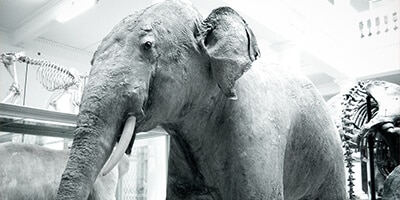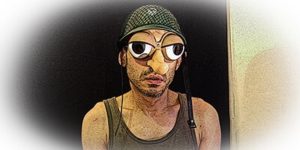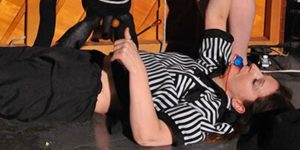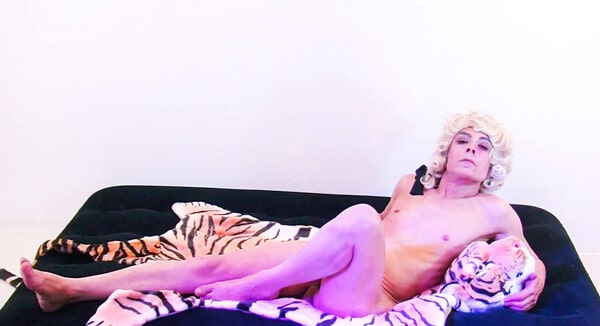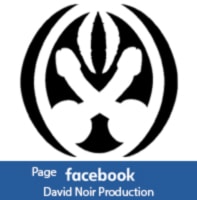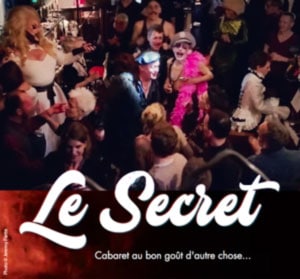The institution, culture and technique of the cuckoo or how to grow and find your food in the nests of other people's talents
Feasting on culture
An institution is a body
Like any organism, its priority is to make the most of what feeds its needs. And these needs are enormous, as much hay as is needed to satisfy the livestock.
Preface in your face
Art, art, art, in astronomical quantities
To each his own. Mine is that of poetic fragmentation and voluntary confusion - of the arts, of genres, of the senses, of the sexes, of the places of the mind and body and, of course, of feelings. And it doesn't matter if no one sees a thing. After all, what would I care if you had my works on the shelves of your memoirs if I didn't remember that they were important to me in the first place.
My path is through the body; my only path is to the body. From love to thirst. An audience in front of me; the largest network of receptive bodies available. Ignorance, fear, the most common commodities among men and women are also found here, smoothed out by the same roll of appetites and tastes for ordinary miracles, from television to shows stamped with the cultural quality label. So we call it the norm. The norm - the individuals who claim it by eradicating a singularity that would be their own - results from the lack of personal ambition to explore the human. We ourselves, oneself; anything other than the power of a supposedly common mental image. In order to shatter the power to its bone structure, it is enough to testify by the millions to our specific singularities in the open. An outing of thought. But do we want it? Who wants it?
What is the role of a state: to take in and protect. We pay for an entity with a flexible, shifting and replaceable head to create and promote a generic image of what is normal; what should happen, what should be done and within what limits.
What seems desirable to enable well-being and self-development - prohibition of murder, assurance of a protective roof and balanced nutrition - and beyond that, social and cultural infrastructure in the broadest sense. The minimum is often only partially provided. Many lack the essentials. Let us be philosophical. What cannot be tolerated, however, is reasoning diktat, paternalistic morality and, at the very least, artistic judgement.
What is the answer to the cultural state, which arrogates to itself the pedagogical power to bring, in a skilfully calculated progression, the gruff consumer to his share of singular art? Quite simply that the State has no business being there. That the power of the arts belongs to those who make them, which in the end could belong to everyone if they took the trouble.
The elephants of power stall the isolation of stage creation
Under the pretext of representativeness, the management of cultural venues has become confused over the years, for the director of the structure, with the choice of his or her own interior decoration in terms of programming; in other words: his or her tastes. However, they are not asked to like, but to hand out a ticket to the comfortable paradise of national exhibition venues to anyone who asks for it. It's like eating. Everyone is entitled to it in the name of the pot that is pooled by the tithe. At least, that is how it should be. It's up to the private sector to make its own choices, and the state to provide for everyone. It wouldn't be any worse. People would come to show their shows, paintings or other creations, simply because they exist. And God knows there would be shit. But shit within reach, free and unfettered shit, just allowed to expose itself by booking a day, a date or a series of dates on an administrative booking schedule. Just to muddy the waters, just to get everyone to put their two cents in, just to take power away from those who have no reason to have it. Not business but exposure. No worse than anything else. Maybe a small fee; a modest participation, just to say; like we compensate free software on the Internet.
For the rest, theatres would be like hotels, which is what they are meant to be, places of rest, where you can breathe a little. Places to stay for a while, to cut yourself off from the everyday world. And there are some rotten hotels and some luxurious ones. Some that most of us will never be able to afford. But there will always be cheap, crappy ones with rooms to spare. A hotel does not depend on a body that ignores the wishes of the customer in question in favour of the sheet metal worker or the colour of the wallpaper in the stairwell. For the role of such structures is to maintain and encourage desire. But that's not the case. To have desire, you need sex somewhere. But administrations pride themselves on not having sex. All the choices are justified, reasoned and above all not impulsive and wet like an excitement.
Experts, but in what exactly?
Highly specialised in bandage camouflage and spontaneous wetting, the expert is the textile fibre of a lying slip, absorbing volumes and moods; a girdle rigidly moulding the deformities of bodies into a single straitjacket. Yes, expert commissions are the briefs of yesteryear, love-killers and anti-sex moulds. The embodiment of seriousness as a screen to preserve one's place. Voracious mushrooms that invented the author service, mycoses of the subsidised flow that proliferate at its touch.
Contagion of the viral institution
The cultural institution has developed into a good-natured pandemic. With rare exceptions where some non-mutant humans happen to have been stranded there and survive for a while on the whim of innocent chance, not all die but all are surely stricken.
A few Langlois, a few fools, a few filthy people. For the others, well-connected civil servants who know the arts, the famous "coups de coeur" (for lack of an ass) also enter into the composition of their role. It would be clumsy and naive to declare oneself totally impartial. Knowing how to show the slightest flaw that makes one human is the new secret boot in fashion since the end of Gaullism. Men and women have changed, haven't they? But underneath these impeccable examples of uprightness and humanities, so approachable, one sometimes discovers imposing, well-fed castrati, immense eunuchs with a sulky pout, unsatisfied by their bombast. All that remains is to be invited to their table. Fortunately, when you don't have much to say in terms of creation, there is still time to open doors. That's what we call digging one's furrow, including in art, when one is not capable of really creating. So here we are.

Culture-hungry pachydermic structures and ordinary consumers both find themselves full and fat, at the very end of the food chain of knowledge-based entertainment. They leave with a sense of duty accomplished, without forgetting to keep a little pear for their thirst and a small snack for the road. Everyone goes on their way out of the contemporary places, well satisfied, taking with them the inevitable brochure, the basket full of food, the spoiled palate, the palate... and the chickens will be well looked after.

